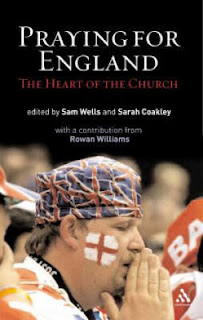Praying for England: Starting a conversation
The following is a discussion started for a group looking at Sarah Coakley's introduction to Praying for England, 'Prayer, Presence and the Poor':
I want to start by
picking out one word, which occurs twice in the opening paragraph. The word is ‘re-imagining’. Some of us will
know that ‘re-imagining ministry’ is one of the priorities the Church of
England has set itself for the next five years.
So it is something of a political word.
In this chapter, the word is linked to something Rowan Williams said at
his very first press conference immediately after he had been announced as the
Archbishop-elect of Canterbury. Heady
days! And something of an irony to be considering it as he prepares to step
down from that role.
But the title of the
book, I think, encourages us to drop the prefix, and to imagine. There is a gentle sporting metaphor in
‘Praying for England’ and for two minutes now, I’d like to crudely take that
gentle metaphor and play it for all it’s worth.
Only two months ago, England were manager-less and ‘re-imagining’ how
English football would work was needed. England,
of course, went out on penalties to Italy.
But what was unusual was that for most of the game, they looked like
they were hanging on for penalties (which never turns out well for
England!). Last night, the Euro 2012
final was held and we were treated to a display from an attractively playing,
technically superb and high scoring Spanish team, who set several records
en-route to winning the title. Everyone
else, it seems, now needs to re-imagine how to play football.
I make the contrast
between these two teams, England and Spain, because I am really not sure
whether Sarah Coakley’s three-fold description of the priestly role as
involving prayer, presence and the poor is more like England’s re-imagining, or
more like the Spanish team! On prayer,
she says absolutely nothing that I disagree with, and much that I think is
vital. The decline of the Daily Office
(if it is so) will have marked consequences for the Church and its ministry,
and raises a whole set of questions for those of us involved in formation. But I’m not sure about the reduction of
prayer to the daily office, and to the daily office said by the clergy at that.
Similarly with
presence. This is clearly in tune with
the Church of England’s stated ambition to provide a Christian presence in
every community. There’s much to be said
about presence, and I hope we’ll start to say some of it. But I fear that this reduces presence to
church buildings. I’m not against church
buildings, but is that all priestly presence is?
When we come to the
poor, again I agree with the sentiment.
But, to mix my sporting metaphors, it feels a bit like the tag-line of
the film ‘Field of Dreams’: “If you build it they will come”. This starts to make me ask questions about
what’s missing from Coakley’s piece.
There is (despite the questions I want to ask of it) an account of
formation and an account of rootedness in place (which we might term
‘incarnation’, although that might just leave us with more questions!). But where is the theology of mission? The very beginning of the service of
ordination of priests says that “Priests are ordained to lead God's people in
the offering of praise and the proclamation of the gospel”. This seems a important omission.
So is Coakley re-imagining
ministry in a way that resembles the England football team, playing for
penalties, or more like the Spanish? I
fear the former, but I’m given hope by the observation that the Spanish flair
is founded on technical ability, and prayer, presence and the poor are perhaps
not a bad place to start with the technicalities of priesthood.First given to a reading group in Derby Church House



Comments